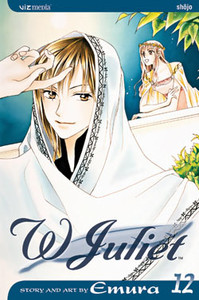Review
by Carl Kimlinger,W-Juliet
GN 12
| Synopsis: |  |
||
The Cultural Festival of Destiny is upon our heroes. Ito and Makoto must play the Romeo and Juliet of their lives if they are to impress the theater critics that Makoto's father has invited to evaluate his son's performance. But first they must dispatch a group of pesky bank robbers whose untimely kidnapping of innocent Nobuko has put the whole shebang on hold. Former club members Toki and Tsugumi prove themselves to be indispensable allies, but no one can help Ito when she must confront, once and for all, Makoto's arranged fiancée Takayo. |
|||
| Review: | |||
Like a plate of fresh cookies on a cold day, reading a volume of W-Juliet is a warm, comforting experience. There are no bad guys in W-Juliet (with the possible exception of Takayo's vile brother); every character is possessed of a certain core decency. Inside every person (or ghost) there is a logical center that, untouched by unkind actions and wrongheaded beliefs, is susceptible to a pure heart and a reasonable argument. No personal or emotional problem is so thorny, so intractable, that it can't be solved with an earnest discussion (or a fist to the face). It's a very seductive worldview, and one that the manga exploits to great effect. This volume is no exception. There're a trio of bank robbers who are slowly thawed by the too-adorable Nobuko's sunny disposition; Toki displays a caring side that has, until now, been hidden under layers of womanizing cad; and even Takayo proves that she has unplumbed depths of maturity and willpower. And for all of the wild hand-to-hand violence and life-and-death crises, happiness is always a simple discussion away. The results are often refreshing, particularly where romance is concerned; there are no drawn-out misunderstandings or endless do-they-don't-they internal monologues, only mutual understanding built on a foundation of clear communication. Ironically, this is also the title's greatest weakness, something that becomes ever more apparent as the manga begins bringing closure to some of the central relationships. There's a very fine line between comfortable and stagnant, and W-Juliet toes it with dangerous frequency. The entire bank robber arc, as enjoyable as parts of it are, is utterly devoid of suspense. So softhearted is the manga that the very idea that serious harm might befall one of the cast is preposterous. Often resolutions are too facile to be credible. This is particularly true once long-standing antagonisms begin to wind down, as they do here. Some ring true, such as a rooftop tête-à-tête between Ito and Takayo, but others—e.g. some important concessions made in the relationship between Makoto and his domineering father—feel hollow. Of course, there's also the usual goofiness to be had, most of it involving Tsugumi and her predilection for weird contraptions, and enough mushy—sorry, make that tender—moments between Makoto and Ito to keep the romantics happy (given how unnaturally close they are, even when around others, it's a wonder that there aren't more widespread rumors of lesbianism). The gender-bending hook and, to a lesser extent, the martial arts action have both fallen mostly by the wayside. This late in the series, it's probably best not to keep flogging the cross-dressing horse, as the time is better spent on more important things such as secondary character development, but the action is sorely missed. There isn't much of a chance for Emura to showcase her surprising grasp of the dynamics of fighting, but her other skills are as strong as ever. While some of the members of the drama club are still generic enough to be confusing, most of the characters are clearly and distinctly drawn, making differentiating them, even during some of the slightly more muddled scenes, a cinch. Characters range from too cool (Toki!) to too cute (Nobuko!) to too beautiful (Makoto!). There are no plain people in W-Juliet, but hey, it is about actors. As befits a story about actors, much attention is given over to costume design, with generally pleasing results. Slow-changing details such as Makoto's height, and Ito's lengthening hair and incremental feminization have been handled well, and pay narrative dividends in this volume. In general Emura's drawings are pleasant, clean and professional. She's a little too fond of speed and impact lines, but makes up for it with an unusual (for shoujo) amount of background detail, and unusually (for shoujo) restrained panel layouts. W-Juliet is pleasant and good-natured to a fault. It isn't handling the resolution of its series-long conflicts as well as it should, and it can never create any real suspense, but if that's the price one has to pay for mainlining another volume of W-Juliet's brand of manga relaxation, then it may just be worth it. |
|
The views and opinions expressed in this article are solely those of the author(s) and do not necessarily represent the views of Anime News Network, its employees, owners, or sponsors.
|
| Grade: | |||
Overall : B-
Story : B-
Art : B
+ Light, feel-good shoujo for the angst averse. |
|||
| discuss this in the forum (2 posts) | | |||
| Production Info: | ||
|
Full encyclopedia details about Release information about |
||